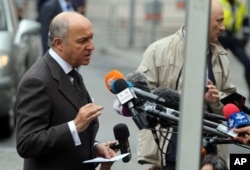Secretary of State John Kerry said Iran nuclear negotiators are hopeful they will be able to reach an agreement but still need to work through some “very tough issues.”
Kerry commented in Vienna Saturday as he launched a series of closed-door talks with Iranian Foreign Minister Mohammad Javad Zarif.
"I think it’s fair to say that we’re hopeful. We have a lot of hard work to do. We have some very tough issues, and I think we all look forward to getting down to the final effort here to see whether or not a deal is possible," Kerry said.
Zarif said the two sides would need to work very hard in order to make progress and move forward.
"I agree ... on the fact that we need to work really hard in order to be able to make progress and move forward. We’re determined to do everything we can in order to be able to make this important milestone, but that depends on a lot of things and we’re going to work on them," he said.
WATCH: Related video by VOA's Heather Murdock in Vienna
If the other side “takes positive steps and does not make excessive demands, we will certainly reach a deal that benefits everyone,” Zarif said earlier Saturday.
3 conditions
French Foreign Minister Laurent Fabius said there were three conditions that still needed to be worked out to ensure a successful agreement.
Fabius said those conditions are Iran’s acceptance of rigorous inspections of suspected nuclear sites, lasting limits on the country’s research and development capacity and a mechanism to quickly re-impose sanctions on Iran if the country violates terms of an agreement.
He commented to reporters Saturday shortly after arriving at the negotiating site.
Kerry met with Fabius later Saturday after the two held separate talks with Zarif.
A senior State Department official said Kerry and Fabius spoke for about an hour. He said Kerry offered condolences on the terrorist attack Friday in France, and they discussed the attacks in Tunisia and Kuwait. He said they spent the rest of their time on the Iran talks.
With the self-imposed June 30 deadline looming, some of the toughest issues remain on the table.
In an interview with the al-Alam news network, Iran’s chief nuclear negotiator, Deputy Foreign Minister Abbas Araghchi, said one challenge is that some of the countries involved in talks had changed their viewpoints since negotiators reached a framework deal on April 2.
He did not specify which countries.
In April, Iran and the U.S., Russia, China, France, Britain and Germany (the so-called P5+1 group) agreed on a plan that was supposed to be the foundation for a final agreement that provided Iran sanctions relief while restricting Tehran’s ability to make nuclear weapons.
However, a top Western diplomat said major differences remained unresolved.
The diplomat, who spoke to reporters in Vienna on the condition of anonymity, said the most difficult issues must be worked out in the coming days, including U.N. inspections of Iran's sites, transparency, sanctions and the possible military dimensions of Iran's atomic program.
Self-imposed deadline
Meanwhile, there is concern that negotiators will not make their self-imposed deadline.
On Thursday, a senior U.S. administration official said negotiators are expected to be "close" to an agreement on June 30, if they "can get there at all."
"If it takes us a little bit past June 30 to have the right content ... what matters here is the substance of the deal, and we have to get it right," the official said.
It would make sense for negotiators to work past the deadline, if need be, to resolve outstanding issues, said analyst Emanuele Ottolenghi of the Foundation for the Defense of Democracies.
“It certainly makes sense if the pressure to meet the deadline is going to sort of bring the quality of the agreement into question,” Ottolenghi said.
Previous extensions
But he said previous extensions in the Iran nuclear talks had resulted in more concessions in favor of the Iranian side.
Some diplomats say the real deadline for an agreement is not June 30 but July 9. After that day, a mandatory congressional review period would extend from 30 to 60 days.
A growing crowd of international journalists has been converging in a tent outside of the building where talks are being held.
Journalists braved sporadic showers on Saturday to shout questions to officials as they arrived.










